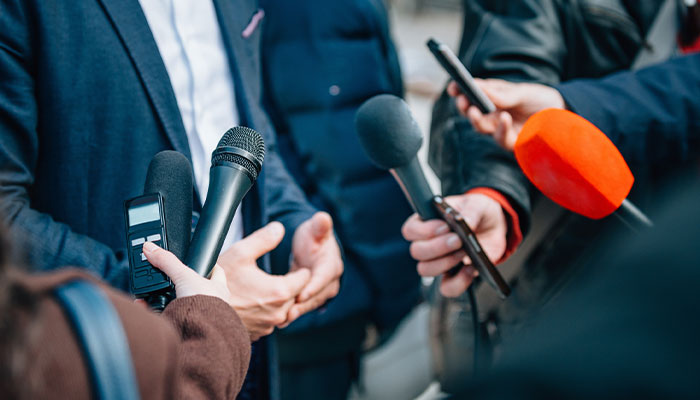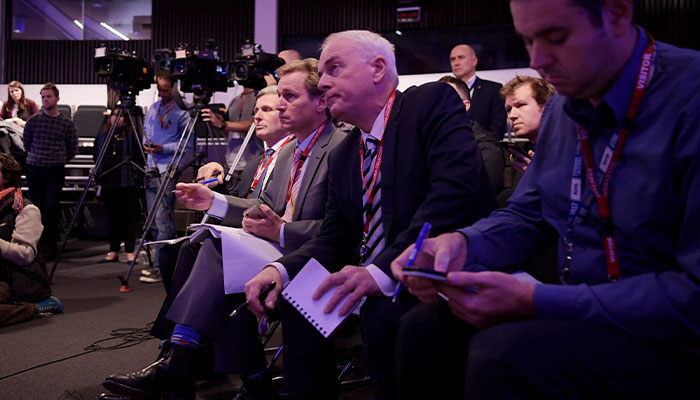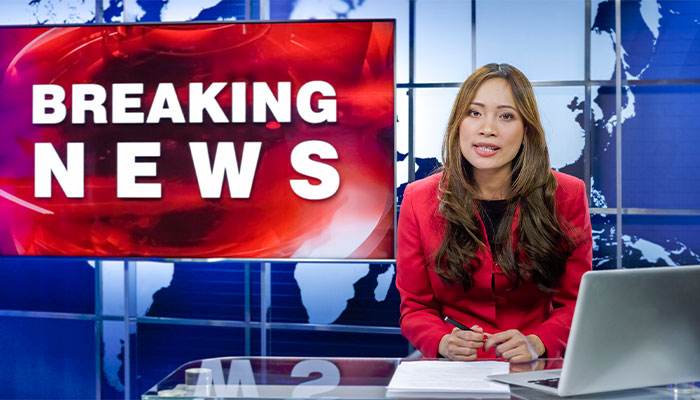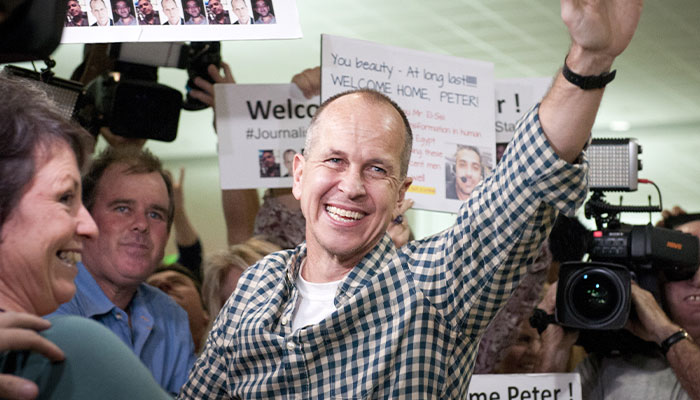For most of us in Australia, press freedom is an abstraction, something we can talk about but not really put our fingers on. We open the papers or go online and see no end of criticism of the government. Journalists are apparently free to say pretty much what they like.

Even for those of us who work in the industry, press freedom can feel a bit woolly – a thing we know we need, but are hardly aware of. Like oxygen, it is simply there, an essential part of life that we barely ever stop to consider until it is threatened or taken away.
When Egyptian government agents barged into my hotel room and arrested me and my two Al Jazeera colleagues on terrorism charges back in 2014, that abstraction suddenly felt very real. We'd been detained on national security laws so loosely framed, that the government had taken to describing interviews with their political rivals as 'promoting terrorist ideology'.
With that in mind, imagine how it felt when, in June 2019, we saw those images of Australian Federal Police wielding search warrants, pushing their way into the home of News Corp journalist Annika Smethurst, and going through the ABC's files. Remember – neither the ABC nor News Corp had published anything that genuinely harmed Australia's security.
With at least 92 new national security laws since 9/11 (and counting), Australia is far closer to Egypt than almost any other Western democracy.
They were raided for using leaked classified information to expose politically embarrassing stories about allegations of war crimes by Australian Special Forces, and plans to let the Australian Signals Directorate use its sophisticated electronic eavesdropping equipment on domestic communications.
Both stories were fine examples of journalism serving the public interest. While there is no suggestion that Australia is about to become Egypt, the political imperatives that allowed Cairo to pass loosely framed national security legislation that was used to silence uncomfortable journalism are the same as the ones that allowed Australia to introduce – yes – loosely framed national security legislation that was then used to go after uncomfortable journalism. And with at least 92 new national security laws since 9/11 (and counting), Australia is far closer to Egypt than almost any other Western democracy.
I am not being so naïve to suggest that the press should have complete freedom. But in classic liberal democratic theory, the media is the 'fourth estate', reporting on public officials, keeping the powerful accountable, and oiling public debate with quality information.
A few academics have gone beyond that fourth estate idea. James Carey, an American communications theorist and media critic at the University of Illinois, argued that journalism is the sine qua non of democracy.
In an essay published in 1999, he said "Journalism and politics cannot be thought of as two separate independent domains. Rather, they are symbiotically connected; they can only be known via their mutual and active adaptations which are cooperative and antagonistic by turns; one can only be known in the light of the other".
The implication of Carey's observation is that even though they look like separate institutions, the two are so deeply connected that if structural change happens to one, it must inevitably affect the other. So, any security legislation that undermines press freedom, that unnecessarily limits the ability of journalists to investigate government, and that exposes journalists' data and their sources to prosecution, also damages the political system the law is trying to protect.
There are innumerable examples of good journalism that have exposed corruption and mismanagement within government, uncovered bad policy, triggered Royal Commissions and Parliamentary inquiries, and generally helped keep the system honest, efficient and effective. But that is despite rather than because of the ever-increasing weight of security legislation that makes it harder and more dangerous for journalists to do their jobs and protect their sources.
There is a bewildering array of overlapping statutes that make otherwise routine journalism risky. For example, the Data Retention Act (2014) exposes the metadata of journalists and their sources to investigation by a host of agencies and departments; the Telecommunications Amendment Act forces anybody who works in the telecoms industry to help security agents hack into encrypted communications between journalists and sources; the Espionage and Foreign Interference Act (2018) makes it dangerous to publish anything that makes Australia look bad to our neighbours.
Of course, since the public outrage that followed those AFP raids, we haven't seen reporters dragged off in manacles, but University of Queensland researchers have found that the laws are working in the way they are supposed to – as a deterrent.
Cash-strapped editors are increasingly bailing out of contentious investigations because of risks to journalists and their sources, or because the costs and stresses of fighting it out in court are just not worth bearing. For whistleblowers, the risks of blowing up your career, being dragged into court, facing massive legal costs and extreme stress is enough to frighten off all but the bravest sources. No potential whistleblower is going to look at the experience of Richard Boyle – the Austraian Defence Force lawyer behind the Afghan Files leaks who is still facing prosecution – and think, "That was worth it".
The argument for a Media Freedom Act
The core of the problem is that Australia has no specific legal protection for media freedom. All we have is that infamous and hopelessly weak implied freedom of political communication, inferred in our constitution. It imposes no positive obligation to protect freedom of speech or of the media. Instead, it is supposed to act as a restraint on legislative overreach, but we've already seen how that works out.

Public interest: Journalists attend a press conference following the 2019 raids by Australian Federal Police on two media outlets.
My organisation, the Alliance for Journalists' Freedom (AJF), has been doing some thinking about what a coherent system of media freedom might look like, that protects the work that journalists do without undermining the ability of our security agencies to protect Australians.
While the gold standard is a constitutional amendment, journalists are about as popular as pornographers, and very few people are likely to vote for a constitutional change that gives them more freedom, rather than tarring and feathering the lot.
We also don't think inserting some kind of journalists' defence in every statute is the right way to go. In their warrant for the ABC raid, the Federal Police cited the Crimes Act which makes it a criminal offence to receive stolen Commonwealth property, and no politician is going to pass a law saying it's okay for journalists to receive stolen goods, even if there is clear public interest.
Instead, a far more elegant solution is a Media Freedom Act that works on three levels. First, it would require legislators to mitigate the impact of any law on media freedom before passing it. Second, in any cases involving journalists, it would compel the courts to interpret legislation in a way that privileges media freedom. And finally, it would make civil servants also act in ways that generally support media freedom.
None of this places media freedom above all else, but it does put the principle at the forefront of public life, rather than treat it as an afterthought in the way it is now. It is also not a new concept. This is exactly the way that Human Rights Acts work in the ACT and Queensland.
Who is a journalist?
Whenever we have these conversations with lawmakers, we are constantly asked who should any laws protecting press freedom apply to? Who is a journalist? It is a vexed problem, and one that academics and the industry have been wrestling with for years. How do we make a meaningful distinction between a reporter live tweeting from a violent demonstration, and an agitator also using Twitter to call in reinforcements? Should the police stop one and not the other?

Trust factor: We've seen a steady decline in public confidence in conventional news, which means the media industry also has work to do.
The solution is to forget about the impossible who, and instead focus on the far more practical how – the journalistic process.
The whole point of press freedom is not to protect a particular group of individuals. It is to protect the democratic role that journalists play. We need a group of people who reliably collect and report accurate, credible, authoritative information that is in the public interest, and who can investigate and hold the government to account.
If you ignore the job title, under the hood you'll find commonly understood ways of gathering, organising and presenting information. Underpinning the whole journalistic enterprise is a set of professional practices, standards, obligations, and ethics that could form the core of a legal definition.
The whole point of press freedom is not to protect a particular group of individuals. It is to protect the democratic role that journalists play.
This approach already exists in our statutes. Section 126K of the Victorian Evidence Act gives journalists the right to protect their sources in court. In setting out its definitions, the act starts in the traditional way, describing a "journalist" as, "a person engaged in the profession or occupation of journalism." But it then goes on to say, "the person or the publisher of the information, comment, opinion or analysis is accountable to comply (through a complaints process) with recognised journalistic or media professional standards or codes of practice."
The first part of the definition is redundant, but the second contains a piece of legislative gold.
It is reasonable to assume that if someone declares a commitment to a set of standards and ethics and then gives the public a way of complaining if they deviate from it, then they are almost certainly working to a much higher standard than someone posting rumours on social media. It is hard to see satirists or bloggers making themselves accountable to the code of practice published by the MEAA – the journalists' union. And if they do, well, they're probably producing works of journalism.
That way, we avoid singling out any group for special treatment. Instead, we protect the role that journalism plays by defining the underlying process that sets it apart from other forms of speech.
But the media industry also has work to do. Apart from a relatively brief trust-bump when people turned to mainstream media during the COVID crisis, we've seen a steady decline in public confidence in conventional news. Some of it is self-inflicted – in the scramble to grab eyeballs online, news organisations have become beholden to a digital world that rewards the sensational over the sober – but it does nothing to shore up public confidence in journalism's output.
A certified tick for professional standards
What if the industry followed the lead of other professional groups like the Institute of Chartered Accountants? What if it used that legally defined process of journalism as the basis for a system of voluntary certification?

Home: Peter Greste on his return to Australia after spending 400 days in an Egyptian prison on terrorism charges.
A professional industry association could set up a certification board that could examine the work of anyone claiming to be producing journalism, and if they are applying those processes appropriately, they could get a little kite mark to go next to their by-line – a bit like Twitter's blue tick. That way, readers and audiences would have a way of recognising journalism created to a professional standard. Social media companies could use that mark as a way of identifying and boosting good journalism. And if the producers of that journalism deviated from the standards, the board would have the power of sanction.
To be abundantly clear, certification would have to be voluntary. Nobody would be forced to get it, and a Media Freedom Act would have to explicitly say governments could not use certification as a way of filtering access. It would be wrong to set up a system of de-facto accreditation that could stop people from producing journalism.
Crucially, under the law anyone who has been certified could get what is known as a rebuttable presumption – courts would start by assuming they are working to professional standards, and it would be up to the prosecution to show why they had failed to meet their obligations. It would stick a thumb on the scales in favour of media freedom, rather than against it as is the case now.
Anyone who is not certified could still benefit from the law, but uncertified journalists would have to show the court that they are meeting the required standards before getting any legal cover.
In short, the AJF is proposing a comprehensive system of reform: the government should introduce a Media Freedom Act. In exchange, the media should set up a system of voluntary certification that would encourage the industry to adopt standards of professional practice. And the two would be linked by a legal definition of journalism as a process.
All this is important not just because of what it means for journalists. It is important because of the impact the erosion of journalism is having on our democracy, on our capacity to have nuanced, complex political debates, and on the ability to interrogate and investigate those who control the levers of power and hold them to account.
It was the French philosopher Albert Camus who said that a free press can, of course, be both good and bad; but a press that is not free can never be anything but bad.
Peter Greste is a journalism professor at Macquarie University and a director and spokesman for the Alliance for Journalists' Freedom.
Register to Attend
Join Peter Greste in a major public lecture this Thursday 1 September 2022 as he advocates press freedom in a democracy and proposes a model of reform. Register here: https://event.mq.edu.au/the-pen-and-the-sword/registration/Site/Register






